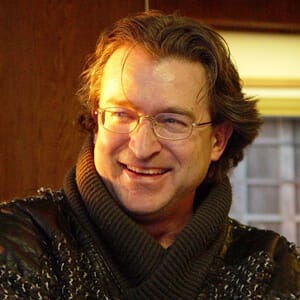Phil Cousineau In Search of the Soul of the World

To untangle the knot of interlocking meanings of these painted words, Phil, who is a logophile and a mythologist, begins each fascinating word entry with his own brief definition. He then fills it in with a tint of etymology and a smattering of quotes that show how the word is used, ending with a list of companion words. The words themselves range from commonplace—like biscuit, a twice-baked cake for Roman soldiers—to loanwords including “chaparral,” from the Basque shepherds who came to the American West; words from myths, such as “hector;” metamorphosis words, like “silly,” which evolved “holy” to “goofy” in a mere thousand years; and words well worthy of revival, such as “carrytale,” a wandering storyteller. Whether old-fangled or brand new, all the words included in The Painted Word reveals the deep history and mystery of words and language.
_______
Gregg Chadwick is a Santa Monica–based artist who has exhibited his artworks in galleries and museums both nationally and internationally. Gregg’s blog, Speed of Life, explores the intersections between the arts and social justice: http://greggchadwick.blogspot.com/. Chadwick’s Flickr page, which is often updated with new paintings, is at http://www.flickr.com/photos/greggchadwick.
“When Phil Cousineau and Gregg Chadwick join creative forces it is an important event. This historic collaboration shines with fresh insights into both language and art.” —Alexander Eliot, author of 300 Years of American Painting and The Global Myths.
Q&A About the Painted Word
What was your inspiration for “The Painted Word”?
While co-teaching creativity workshops with my collaborator Gregg Chadwick, I suddenly recalled the painter Van Gogh’s great line: “Color in painting is like enthusiasm in life.” I realized that the two of us loved painting as an art form and as a metaphor: Gregg paints poetry, I paint words. We each love color—in painting and in language. Thus was born “The Painted Word”.
What is the difference between a wordlover and a wordcatcher?
While we all love the occasional word, say, in a memorable song, a speech, a sports description, most of us also simply smile and don’t literally take note(s). The wordcatcher catches sight or sound and immediately takes a mental or physical note, in order to use it in conversation or written form. So since the completion of this book I continue to write ’em down—“etymon,” meaning the true meaning of words, “logrolling,” doing favors for friends, “Stay tooned,” a typo from a friend that is so comical I’ve used it ever since. A “trampire,” is a tramp-vampire. And so on, endlessly.
OMTimes Magazine is one of the leading on-line content providers of positivity, wellness and personal empowerment. OMTimes Magazine - Co-Creating a More Conscious Reality


